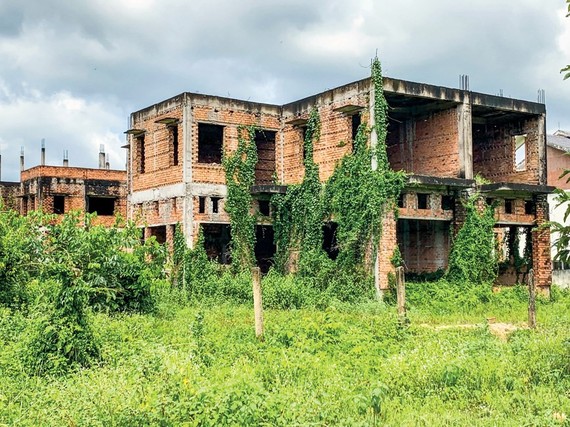At a seminar organized by the Business Forum Newspaper in Ho Chi Minh City titled, ‘Opinions to overcome difficulties of Real Estate Enterprises’, many experts believed that conflicts and overlapping of legal regulations in the construction sector have led to delays in many projects, even those that were inspected and audited a long time back, creating opportunities for corrupt activities.

Many projects are on hold due to legal problems. Photo M Tuan
Consequences could lead to price hike
Professor Dang Hung Vo, former Deputy Minister of Natural Resources and Environment, said, "The real estate market in 2019 has been slow due to unclear legal regulations, although market liquidity is still very high. According to the data from businesses, in particular from foreign consulting firms in Vietnam such as CBRE and Savills, all sell out is estimated at 70% of immediate sales. Market demand is still huge, while supply has narrowed from the beginning of 2019”.
“For example, Condotel investors asked to change the legal regulations. Secondary investors do not dare to take risks. Housing real estate also fell into a similar situation because of legal conflicts between the three main areas of investment, construction and environmental resources. Regulations in specialized legal systems are not consistent, with many gaps".
“The current consequence is a crisis for supply rather than consumption, and supply is affected by laws and regulations. Surely supply will shrink in the next few years. Reducing supply but still having high consumption will push up prices. If we do not increase supply immediately, and do away with unnecessary regulations, the economy will suffer. Therefore, it is necessary to resolve all legal issues early, so that from now until 2020 it will be possible to increase the supply and avoid negative consequences”.
Professor Vo emphasized and pointed out five main groups of inadequacies in Laws on investment, construction and businesses:
First, many legal terms are used inconsistently in specialized laws, and in each law these terms are not defined specifically, leading to complex law enforcement in localities.
Second, the order and procedures for investors to be approved for investment still have many disparities between laws on investment, construction, housing, planning, environment and land.
Third, regulations on rights and obligations of investors are not consistent with the provisions of the Land Law and the Civil Code such as, land rental exemption and reduction associated with investors' rights and obligations (between Investment Law and Land Law); rights and restrictions on transfer of investment projects (among Investment Law, Land Law, Housing Law and Real Estate Business Law); and long-term residential land use rights (between Housing Law and Land Law).
Fourth, regulations on land access methods in investment projects still have many gaps and do not guarantee consistency.
Fifth, the absurdity of the Investment Law and the Land Law on the termination of investment projects and land acquisition.
The reasons given by Professor Vo are mainly due to the existence of many gaps and overlaps in the current law due to ineffective methods in formulation of laws in our country. The process of formulating and appraising bills, decrees and circulars do not involve opinions of experts, so it is impossible to detect conflicts with other relevant laws.
Reconsider methods to build regulations
In order to remove the inadequacies raised, Professor Dang Hung Vo said that it is necessary to reconsider how to build regulations. Participation in the formulation of laws must involve the non-state sector such as institutes, universities, business associations, and scientific associations. At the same time, localities must continue operating investment projects to avoid state of conflict.
Professor Dang Hung Vo proposed three sets of solutions. (1) System of legal documents need higher-level issuing agencies and more validity. (2) Documents issued later are more effective. (3) Regulations with specialized content will have more effect. With these three solutions, legal conflicts must be reviewed to determine which regulations are effective and which ones must be ignored. From thereon, it is possible to develop documents in the form of manuals to offer guidelines for resolving existing legal conflicts.
Mr. Hoang Hai, Director of the Southern Department of Ministry of Construction, said there are currently about nine laws, surrounded by decrees, circulars and more than 20 administrative governing issues related to construction and land. In particular, the Ministry of Construction is revising the Construction Law according to three groups, including reforming and simplifying procedures; simplifying and abolishing business conditions; and synchronizing with other laws.
Dr. Vu Tien Loc, Chairman of Vietnam Chamber of Commerce and Industry (VCCI), emphasized: “We are aiming for high growth. But with concerns about the growth prospects of this year and the coming years, and amid the adverse effects of trade war, it will be difficult to achieve this growth target. Removing difficulties in the real estate market will contribute to ensuring budget revenues and solving housing problems. More than ever, management agencies and concerned ministries and agencies need to act quickly to resolve all the current difficulties and obstacles."
Source: Saigondautu.